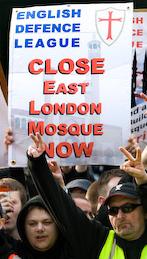 The campaign to have a march planned by the English Defence League through one of London’s most ethnically-diverse boroughs banned looks to have been successful. The Metropolitan Police has announced that it is “in the process of applying to the Home Secretary for authority to prohibit a march in five London boroughs for a period of thirty days.” It will be effective from 2 September.
The campaign to have a march planned by the English Defence League through one of London’s most ethnically-diverse boroughs banned looks to have been successful. The Metropolitan Police has announced that it is “in the process of applying to the Home Secretary for authority to prohibit a march in five London boroughs for a period of thirty days.” It will be effective from 2 September.
More details of the application are promised later, including the names of the boroughs affected, one of which is undoubtedly Tower Hamlets. The application, which is highly unlikely to be turned down, applies to all marches in the boroughs concerned, including a planned counter-march against the EDL.
Tower Hamlets mayor Lutfur Rahman has applauded the decision of acting Met commissioner Tim Godwin, thanked the “thousands of people” who supported the campaign and asked those who had planned “to march in support of our cause to stand down.” He added, “You have helped us achieve our aim and we no longer need a mass show of support.” Tower Hamlets borough police commander Paul Rickett is understood to be fully in support of the measure, although as an East London Advertiser report indicates, the possibility remains of rallies or static demonstrations taking place.
The EDL’s eagerness to parade in Tower Hamlets arises from a false belief that the borough is seething with Muslim extremists plotting to infiltrate political institutions and destroy English cultural traditions. This is, of course, a ludicrous distortion of reality based on a fantasy version of the East End and its history. Sadly, it is hardly contradicted by selective, exaggerated and simplistic reporting by some journalists. The area has even been described as an “Islamic Republic“, when it is plainly no such thing.
These are sensationalist simplifications of an extremely complex picture. They may generate marketable media product, but by neglecting such crucial factors as the wider story of Bangladeshi Londoners’ long-running community struggles, the role of competing groups within the Tower Hamlets Labour Party and the intricacies of local Muslims’ social and political activism they obscure far more than they claim to reveal. They also do more harm than good to a part of the capital that has many social problems and where maintaining what are generally good community relations can require considerable subtlety and skill.
Dave Hill’s London Blog, 25 August 2011
The prospect of a static assembly by the EDL does indeed remain. However, the police have the power under Section 14 of the Public Order Act to “give directions imposing on the persons organising or taking part in the assembly such conditions as to the place at which the assembly may be (or continue to be) held, its maximum duration, or the maximum number of persons who may constitute it”.
West Yorkshire Police used Section 14 in Dewsbury in June, when they refused to allow the EDL to hold its static protest in the town centre and instead penned them in the station car park, well away from the Muslim community they had come to intimidate. The acting Met police commissioner should be urged to do the same, by banning the EDL from holding their protest anywhere near the centre of Tower Hamlets and instructing them to hold it, say, in a fenced-off area of Victoria Park.
If the EDL were allowed to hold a static protest near the centre of Tower Hamlets they would no doubt be escorted by the police to the area where the protest was to be held, so they would effectively get to have a march anyway, with the consequent threat of public disorder that led to their march being banned in the first place.
Update: See “Full speed ahead for anti-EDL demo: Sat 3 Sept, Tower Hamlets”, UAF news report 25 August 2011
